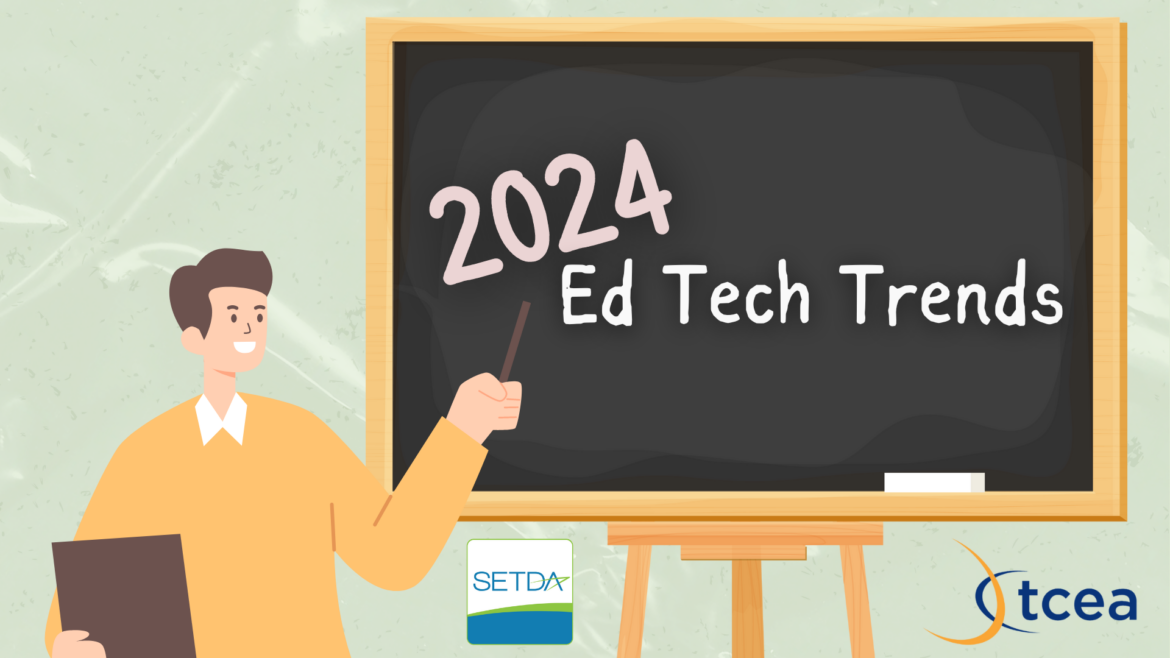As we move further into 2024, the role of educational technology (Ed Tech) in shaping the future of education has never been more critical. The 2024 State Ed Tech Trends Report, published by the State Educational Technology Directors Association (SETDA), highlights key developments, challenges, and opportunities for state leaders. As a State Affiliate Member of SETDA, the Texas Computer Education Association (TCEA) is committed to ensuring that Texas remains at the forefront of EdTech adoption and innovation, particularly as we navigate this transformative era for education. Keep reading to discover four of the top 2024 ed tech trends.
1. Artificial Intelligence (AI) in Education: A New Frontier
One of the key takeaways from the 2024 ed tech trends report is the increasing integration of Artificial Intelligence (AI) into K-12 education. In fact, state agencies across the country are stepping up to provide more support and guidance on the responsible use of AI in classrooms. Texas is no exception. AI offers exciting potential to enhance personalized learning, automate administrative tasks, and provide teachers with valuable data insights. However, it also comes with risks, including concerns about privacy, security, and equity.
State leaders must continue to work on developing comprehensive AI policies that ensure safe and effective implementation. At TCEA, we support this movement by advocating for responsible AI integration and providing resources for Texas educators to understand how these tools can benefit teaching and learning. We are especially excited to see the rise of human-centered AI approaches, which prioritize empowering educators rather than replacing them. Collaboration among teachers, policymakers, and technology experts is key to ensuring AI enhances student outcomes without compromising safety or equity.
2. Cybersecurity: A Top Priority Amidst Rising Threats
For the second consecutive year, cybersecurity ranks as the top priority for state education technology leaders, and remains one of the top 2024 ed tech trends. Schools have increasingly become targets for cyberattacks, with sensitive data at risk. According to the report, schools have surpassed even hospitals and government offices as prime targets for attacks, making cybersecurity a critical focus for districts.
Texas, like other states, is grappling with the need for robust cybersecurity infrastructure. Many districts, particularly those in rural or under-resourced areas, may lack the necessary tools to combat the ever-evolving threat landscape. While some progress has been made, fewer state leaders believe there is sufficient funding for cybersecurity in 2024 compared to previous years. This highlights an urgent need for states to prioritize cybersecurity budgets and training.
TCEA is actively working with Texas districts to build stronger cybersecurity defenses by providing professional development opportunities, advocating for funding, and promoting best practices.
3. The Funding Dilemma: A Post-Pandemic Reality
As federal pandemic relief funds (such as ESSER) expire, many districts face significant challenges in maintaining their technology initiatives. The 2024 report highlights increasing anxiety among state leaders regarding the future of funding for ed tech. In particular, concerns are growing around how districts will replace or maintain devices that were purchased with pandemic-era funding.
The expiration of federal funds also brings renewed attention to long-standing issues like home connectivity and broadband access, especially for rural and underserved communities. In Texas, where geographic disparities in internet access remain a significant barrier, this is particularly concerning. Many students still lack reliable internet access, which impedes their ability to fully engage in remote or hybrid learning models.
TCEA is committed to addressing these challenges by advocating for sustainable funding solutions at both the state and federal levels. We also work closely with districts to ensure that every student has access to the devices and connectivity they need to succeed. Programs like the federal Broadband, Equity, Access, and Deployment (BEAD) initiative offer promising pathways to bridge the digital divide, but it will require continued advocacy and collaboration to see these efforts through.
4. Opportunities for Growth: Enhancing EdTech Capacity
A critical finding of the report is that many state education agencies (SEAs) are investing more in their own capacity to manage and support ed tech initiatives. In Texas, building this internal capacity is essential for ensuring the effective and equitable use of technology across districts.
For instance, only 11% of states currently require local districts to develop formal ed tech plans, according to the report. Without such plans, it becomes difficult to measure progress and ensure that technology is being used strategically to improve learning outcomes. This presents a clear opportunity for growth in Texas. By encouraging districts to create comprehensive ed tech plans, we can better align technology initiatives with instructional goals and ensure that technology investments are being used to their full potential.
Furthermore, the integration of Universal Design for Learning (UDL) principles into ed tech plans remains an area where improvement is needed. UDL is a framework that aims to optimize learning for all students by providing flexible learning environments that accommodate individual needs. As the report notes, only 38% of SEAs currently provide guidance on UDL, leaving room for Texas to take the lead in promoting more inclusive, student-centered learning environments.
Preparing for the Future of Education
As we look ahead, it’s clear that educational technology will continue to play an essential role in shaping the future of learning. The 2024 State Ed Tech Trends Report highlights both the incredible progress that has been made and the challenges that lie ahead. At TCEA, we are committed to supporting Texas educators, students, and leaders as they navigate this rapidly evolving landscape. By focusing on responsible AI adoption, strengthening cybersecurity, securing sustainable funding, and enhancing ed tech capacity, we can ensure that Texas remains a leader in 21st-century education.

